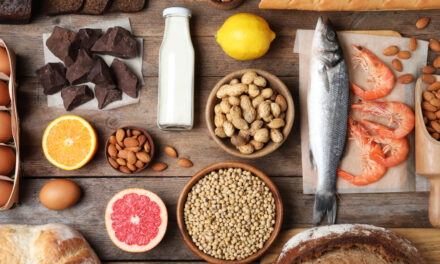How Your Diet Can Impact Your Metabolism

“A good metabolism” really refers to metabolic efficiency, or the body’s ability to burn body fat for fuel, explains Dr. Cate Shanahan, author of The Fatburn Fix. [1] [2] Although certain foods and drinks (like green tea, chile peppers, and grapefruit) have been touted as metabolism boosters, the truth is there’s no magic bullet when it comes to optimizing this function. “There’s not a lot of science to support that certain ‘superfoods’ increase our metabolism in the way that most people probably hope for, by burning body fat,” says Diana K. Rice, RD, owner of Diana K. Rice Nutrition, LLC. Still, some strategies could prove helpful. [3]
5 Ways to Support your Metabolism with your Diet
Eat a nutrient-rich diet full of “good” fats
“The foods our body wants will have a positive effect on our metabolism,” says Dr. Shanahan. “It’s the deficiency of those foods that leaves us with metabolic inefficiency.” In particular, fats—especially monounsaturated (as in avocadoes) and saturated (as in red meat and whole eggs)—supply us with energy. Across the board, try to eat a diet rich in healthy fats, plus protein, vitamins, and minerals, she counsels.
Consider caffeine
Complementing these foods, caffeine helps us use adrenaline more efficiently, and adrenaline helps us release energy from our body fat and liver glycogen into the bloodstream, says Dr. Shanahan. Adds Rice, “There is some research that shows that caffeine and certain compounds in green tea called catechins may stimulate energy expenditure for some people…But it’s important to note that the degree to which this is true varies by the individual, so it’s hard to say which people will respond and at that, the effect is minimal.”
Avoid seed oils and refined carbs
What’s most key when it comes to increasing metabolic efficiency is avoiding certain foods, says Dr. Shanahan. “Everyone’s metabolism would operate more efficiently if our food supply were not flooded with metabolism-damaging foods full of seed oils, like sunflower or canola.” [4] These polyunsaturated fats cannot supply our cells with energy very efficiently and tend to accumulate in our body fat after years of eating them, she explains. The result: “we’re left feeling tired and hungry far more often than if we’d never eaten them.”
Refined carbohydrates are also problematic. When we consume them, our bodies release a lot of insulin, which Dr. Shanahan describes as the hormone of energy storage. Insulin converts the sugars in those carbs into body fat while hindering the burning of existing stored body fat. The burst of energy we experience is temporary, thanks to the spike in blood sugar. As soon as the sugars are stored as fat, we’ll experience hunger again.
Skip the traditional high carb breakfast
“Your dietician will say you need a high carb breakfast to fire up your metabolism, as if it’s some kind of engine or furnace with a pilot light,” says Dr. Shanahan. “Unfortunately, carbs are the worst kinds of foods to eat in the morning.” That’s because, in the a.m., our bodies release adrenaline and cortisol, hormones promoting the burning of our stored body fat for energy. Yet, when we consume carbs, we produce more insulin, which leads to the storage of energy in the form of body fat. With these hormones clashing, our bodies produce more insulin “to get our blood sugar under control.” Instead of a traditional breakfast, Dr. Shanahan starts her day with cold brew with a cup of (raw, grass-fed) whole milk and an 1/8 cup of cream.
Remember to eat enough
“Whenever we restrict our caloric intake below what our bodies need to thrive, we send a message to our bodies that there is not enough food available,” says Rice. Then, “our metabolisms will slow down and make the most of every last calorie we consume. The best thing you can do for your metabolism and your overall health is to eat when you’re hungry.”





